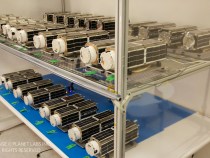Nov 26th 2013, 14:00, by Ryan Lawler

Satellite imaging startup Planet Labs just successfully launched two satellites into orbit, but its biggest milestone is yet to come. The company, which builds inexpensive, low-flying satellites called “doves,” is preparing to launch the largest constellation of Earth-imaging satellites ever.
Planet Labs produces satellites that are ultra-efficient to make and operate, lowering the cost of satellite imagery while getting better images more often. Its “doves” are much smaller and fly much lower than traditional satellites, at an orbit of around 400 to 500 kilometers compared to 800 to 1,200 kilometers above earth. That said, Planet Labs doves don't live as long, with a typical life-span of about one to three years.
One of the other nice things about making short-lived commercial satellites is that Planet Labs can frequently upgrade its equipment, with each new version of its Doves having the most advanced technology available for use. Compare that to traditional satellite shops, which require multiple years of development to ensure that they won't crap out early in their expected lifecycle. Doves, on the other hand, are more or less made to be disposable - and that's a good thing.
Since the satellites are much closer to earth, they're able to catch high-resolution images, which can be used for a number of different applications, such as monitoring deforestation, improving agricultural yields, and tracking natural disasters. Planet Labs co-founder and CEO Will Marshall says the company has engaged with a number of partners that could be interested in the company's data, although none have been announced yet.
Planet Labs already had two satellites sending back imagery, with Dove 1 and Dove 2. It recently added two more, sending Dove 3 and Dove 4 into space on a Russian Dnepr rocket. But the main event will come with the launch of its Flock 1 constellation, which is slated for December.
The company's first constellation of satellites will be made up of 28 doves that will be launched on board an Antares rocket taking off from NASA Wallops Flight Facility in Virginia. That constellation will create images of the entire world over a very short time span, providing an unprecedented amount of data for enterprises that need use of it.
Planet Labs was founded by former NASA physicists Will Marshall, Robbie Schingler, and Chris Boshuizen. The company has raised $13 million from Draper Fisher Jurvetson, Capricorn Investment Group, O'Reilly AlphaTech Ventures, Founders Fund Angel, Eric Schmidt's Innovation Endeavors, Data Collective, and First Round Capital.

No comments:
Post a Comment